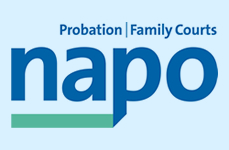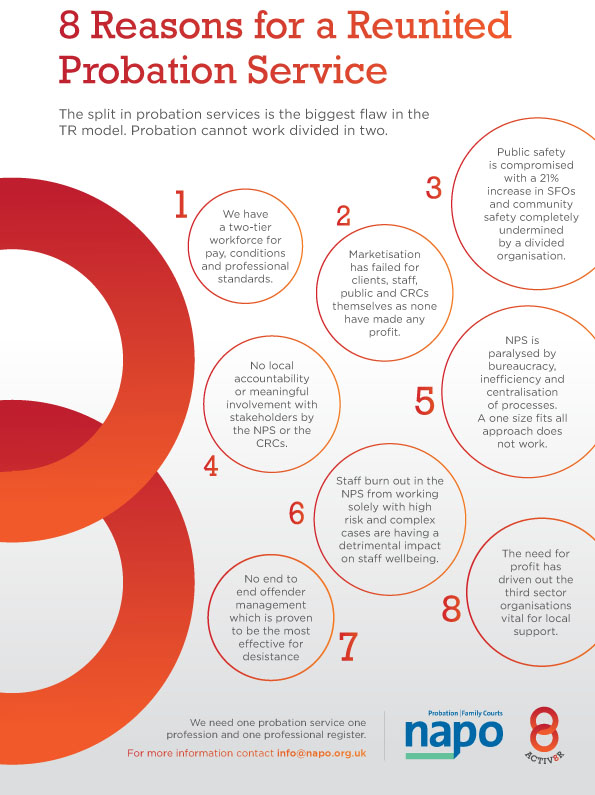Napo’s warnings of the dangers of “burnout” for NPS staff with only high-risk caseloads have sadly proved real.
Before the split, staff were more likely to have a balanced caseload that provided some light relief and assisted with risk management by keeping staff grounded. Working in one team, in one office, also enabled a sharing of work and caseloads and gave development opportunities.
NPS staff are now swamped with the relentless nature of the high risk, often appalling, cases they carry. Apart from wearing staff down it is also in danger of stripping away the sensitivity required to retain a balanced perspective, with staff becoming desensitised by the extreme nature of the cases with whom they are required to work.
A survey by Napo last year showed that this ‘pressure cooker’ situation is having a real impact on staff who spoke of feelings of professional inadequacy, high levels of sickness, impacts on families and personal physical and mental health.
Here are some typical responses from Napo members working in the NPS.
“I feel demoralised and have experienced high levels of stress which have impacted on my health.”
“My caseload impacts upon my health (sickness absence highest ever been and worries me) wellbeing (struggling to fit in personal life/commitments), stress levels…..”
“sleeplessness, gastric problems, relationship difficulties, snappy with colleagues, feelings of guilt and frustration”
“Waking up in the middle of the night worrying about what I haven't done the day before and what I need to do when I get to work, forgetful, anxious, difficulty breathing and scared.”
“I am desperately trying to remain at work but my mental health is deteriorating after such a long time under significant stress and it has led to problems in my relationships at home.”
Worryingly, a number of members cited work related issues as directly linked to serious health issues including heart attacks and strokes experienced by themselves or colleagues.
High workloads are also in the mix. The NPS has been severely short staffed from the get go, due to bad planning and an underestimation of the number of cases that it would be given.
Members have told Napo that the sheer amount of work that staff are expected to manage is overwhelming with many recording levels of between 100% and 210% on the workload management tool (WLMT) matrix. This is unsustainable. One PO said staff had “..no time to do any offence focused work and are constantly fire-fighting.”
The NPS admitted to the Justice Select Committee Inquiry in 2018 that it that it needed to recruit roughly 1,500 POs and PSO to undertake face-to-face work with offenders; while Probation Director, Sonia Crozier, said that in the first half of 2017 the NPS had fell far short of its target for increasing staffing.
Napo told it that: “Staff shortages, excessive workloads and inadequate management support is having a detrimental impact on NPS staff and burn out is becoming apparent through sickness figures. Staff morale is at an all-time low with many staff leaving the profession.”
Napo will be hosting a drop-in session for MPs on 1st of May to put this, and seven other reasons to reunify the probation service to MPs.
If you haven’t already done so, complete the postcard and send it back to your local MP encouraging them to join the fight to make sure the probation service is able to rehabilitate clients, keep the public safe and to protect your profession.
Need any materials to be a part of the campaign? Email campaigns@napo.org.uk

 Great news! The Shrewsbury 24 Campaign has won a crucial victory in its long struggle to overturn the convictions of the building workers who were tried in 1973/74 for picketing during the national strike. On Tuesday 30 April 2019, halfway through the Judicial Review hearing in the Birmingham Administrative Court, the Criminal Cases Review Commission conceded the case. It agreed to reconsider the referral of the convictions of the pickets to the Court of Appeal.
Great news! The Shrewsbury 24 Campaign has won a crucial victory in its long struggle to overturn the convictions of the building workers who were tried in 1973/74 for picketing during the national strike. On Tuesday 30 April 2019, halfway through the Judicial Review hearing in the Birmingham Administrative Court, the Criminal Cases Review Commission conceded the case. It agreed to reconsider the referral of the convictions of the pickets to the Court of Appeal.  Napo held a successful parliamentary drop-in event on Wednesday 1st May to brief MPs on the costs of TR and a split service and the need for a reunified probation service. CRC reps from across the country attended the event to deliver firsthand information on the local situation in MPs areas. A briefing pack, expanding on the 8 Reasons Campaign was available for MPs on the day. You can find these on the
Napo held a successful parliamentary drop-in event on Wednesday 1st May to brief MPs on the costs of TR and a split service and the need for a reunified probation service. CRC reps from across the country attended the event to deliver firsthand information on the local situation in MPs areas. A briefing pack, expanding on the 8 Reasons Campaign was available for MPs on the day. You can find these on the  Napo has been invited to take part in the Lib Dem Justice Team's consultation on a new policy for the party on the rehabiliation of offenders. The consultation paper
Napo has been invited to take part in the Lib Dem Justice Team's consultation on a new policy for the party on the rehabiliation of offenders. The consultation paper  Napo, welcomed many of the findings in the
Napo, welcomed many of the findings in the